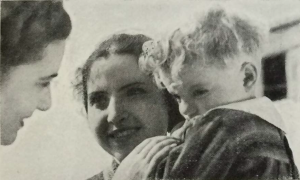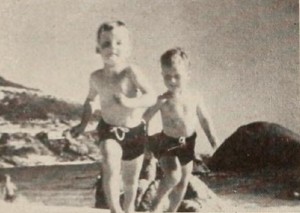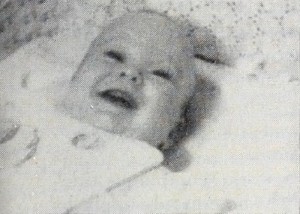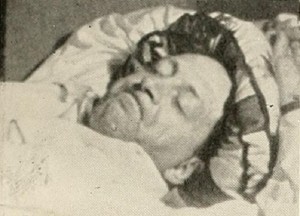
"a sogg. lungh. norm." Feature fiction film
"La grande casa, realizzato da Guido Pallaro, Cesco Cocco, Fernando de Marzi, soggetto di Giulio Fracarro, operatore Antonio Schiavinotto, interpreti Livia Lauri, Otello Toso, Lia Zanolla, Ario Chiarin, Luisa Sironi, aiuto Giorgio Pomerri. II film prodotto dalla Sezione Cinematografica del GUF di Padova che nelle prove precedenti ha dimostrato di possedere un buon numero di elementi volonterosi e di sicure possibilità, risente nel suo complesso della bontà della organizzazione; e questo un elemento da tener presente, perché mostra che ove alla buona organizzazione si venga ad aggiungere una piu persuasiva forza artistica, il gruppo Padovano potrà raggiungere risultati cospicui. Il difetto della Grande Casa sta appunto nella mancanza di forza interiore. Il tema prescelto, la costruzione della Casa dell'assistenza, non è stato svolto in uno scenario organico e provvisto di elementi atti a permettere una realizzazione più serrata e convincente; invece la narrazione è un po' preoccupata, lenta e dispersiva. Comunque il film non manca di momenti felici, di qualche buona descrizione ambientale, di sobrietà interpretativa; cosi pure l'assenza di retorica e un elemento da non trascurarsi e che torna a vantaggio della produzione."
"The Great House (La grande casa), by Guido Pallaro, Cesco Cocco, Fernando de Marzi, subject by Giulio Fracarro, cameraman Antonio Schiavinotto, actors Livia Lauri, Otello Toso, Lia Zanolla, Ario Chiarin, Luisa Sironi, assistant Giorgio Pomerri. The film produced by the Padua GUF Cinematographic Section, which in previous tests has demonstrated that it possesses a good number of willing elements and certain possibilities, suffers in its entirety from the virtue of the organization; and this is an element to keep in mind, because it shows that where good organization is added to a more persuasive artistic force, the Paduan group can achieve significant results. The defect of The Great House is precisely in its lack of inner strength. The theme chosen, the construction of the House of assistance, was not carried out in an organic scenario nor was it provisioned with elements to allow a more tight and convincing direction; instead the narrative is a little worried, slow and scattered. However, the film does not lack apt moments, of some good environmental description, of interpretative sobriety; so also the absence of rhetoric is an element not to be neglected and that returns to the advantage of the production."
—Il ventuno 28 (Review of the G.U.F. of Venice), May 1935
"Family scenes in the garden at Greenbank, Keswick - the children dance, do somersaults, skip and perform for parents and grandparents." (NWFA Online Database)
"Green Christmas is a seven-minute gift from Roy Martin of Annandale, Va., done to the tune of Stan Freberg's recording of the same name. Clever animation and a wide use of imagination make this almost-too-long film quite entertaining. You'll like this version of how commercial Christmas can get. It's in glorious Christmas color" PSA Journal, Nov. 1969, 57.
"Girls playing in the garden and posing for the camera. One young girl plays with a toy steam train as a dog wanders about." (NWFA Online Database)
"It has a story with titles in verse telling how the farm woman compared herself with the Duchess of Windsor and decides she prefers Pa to the Duke and her own simple tasks to the life of a Duchess." American Cinematographer, Feb. 1940, 87.
"Footage of a day on the fells; the car pulls out of the driveway, followed by scenes of the landscape and family members." (NWFA Online Database)

"From Capetown, South Africa, comes Help Yourselves, Boys!, by Lewis Lewis, a charming record of two handsome youngsters and their father engaged in planting, growing and harvesting zinnias. Using many effective angles and double exposed titles, Mr. Lewis relates a plausible tale of his boys raiding the grape arbor, being caught, and finally having their exuberance turned toward flower growing. Since the newly hatched garden is situated close to the ocean, the scenic backgrounds are startling as well as pleasant. Rich, black earth and flaming orange zinnias provide an attractive setting for an engaging family movie." Movie Makers, Dec. 1947, 538.
"This time the Lawlers have produced a short-family picture in several parts. Each part is filmed to the interpretation of a poem recited by a very young voice, undoubtedly a member of the Lawler clan. The stories include the Shoemaker, the Bath, the Party, the Counterpane, snow (sleigh riding) and Hiding. A pleasing picture of the children accompanied by the voice of the little girl" PSA Journal, Nov. 1959, 48.

"Louis Dishotsky and Arthur Rosenthal have put together in High Card Goes an entertaining variation on the travel record film. A definite story line replaces the usual slight continuity device. A pair of tickets for a Florida trip are won on a radio quiz show, but since both parents and two children cannot go, the mother and the father draw cards, high card winning. Wifey tops her mate's king with an ace and takes off for Florida, with the older child. The luckless husband is left to tend the baby and the house. While the acting is fine and the production is technically competent, the pictorial-dramatic pace is rather slow. Tighter editing is indicated." Movie Makers, Dec. 1951, 411-412.

"A clever little domestic story, unpretentious but told in a good cinematic style, comes from the camera of J. Owen Campbell, in His Off Day. Here are recounted the difficulties experienced by the father of a family in his endeavor to relax on his day off. Constantly frustrated in his attempts, he finally seeks refuge in the family car, with results which provide an amusing surprise ending, notably clever in treatment. Technically, the outstanding feature of this film is the handling and lighting of the interior shots, which are uniformly good, with the exception of one or two of them. Mr. Campbell has demonstrated in this film that a simple story, enacted in familiar settings by members of one's own family, offers the most usable material for the average movie maker's indoor efforts. It is for such an outstanding embodiment of this principle that the producer of His Off Day is especially to be commended." Movie Makers, Dec. 1940,602-603.
Total Pages: 15